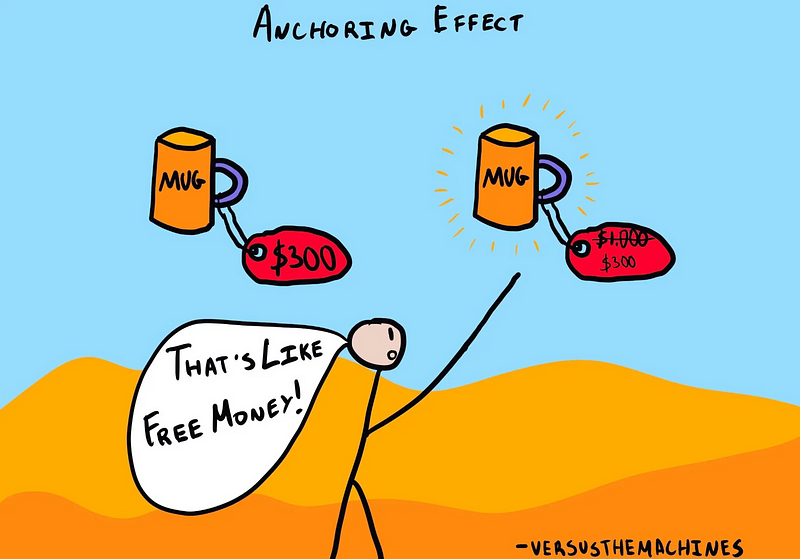Understanding Cognitive Biases: 7 Insights for Better Happiness
Written on
Cognitive biases often influence our happiness without our realization. As Penn Jillette states, “If there’s something you really want to believe, that’s what you should question the most.”
My exploration of human behavior suggests that our struggles may not stem from external factors like economics or society, but rather from a lack of effective thinking skills—essentially, education in critical thinking. This includes understanding how to define problems, evaluate solutions, and rely on data rather than intuition.
Mastering effective thinking is a lifelong pursuit, beginning with recognizing prevalent cognitive biases and developing strategies to mitigate their impact.
#1: The “Us vs. Them” Bias
The “us vs. them” bias leads us to view those who differ from us—be it in appearance, culture, or beliefs—as threats. According to Psychology Today, this bias likely evolved as a survival mechanism in our ancestors, who competed for resources.
This bias manifests in various contexts, from racial and cultural discrimination to personal grievances, such as individuals blaming others for their failures in relationships.
Furthermore, this tendency simplifies complex identities into binary categories, overlooking the nuances of human experience.
The world comprises a spectrum of identities and experiences, and often we share more in common than we realize.
When you feel inclined to categorize yourself and others, take a moment to reflect on your similarities instead of your differences.
#2: The “Good vs. Evil” Bias
Shifting from an “us vs. them” perspective to a “good vs. evil” mindset is challenging. People often categorize the wealthy as greedy and the poor as virtuous or view believers as good while labeling non-believers as sinful. This oversimplification ignores the complexities of societal issues, which are often the result of systemic failures rather than individual malice.
For instance, high medication costs in developing regions arise not from greed, but from pharmaceutical companies prioritizing research for affluent markets.
Recognizing that most individuals are striving to navigate a challenging world helps us seek cooperative solutions rather than designate “bad guys.”
In professional settings, this awareness can foster collaboration instead of conflict, leading to constructive problem-solving.
#3: The Anchoring Bias
The anchoring bias occurs when we rely too heavily on the first piece of information encountered when making decisions. This often skews our judgment, particularly in negotiations, where initial offers set a perceived value.

This bias extends beyond financial decisions; it influences our emotions and perceptions in everyday life.
To counteract the anchoring bias, focus on objective facts rather than initial impressions, allowing for clearer evaluations of situations.
#4: The Urgency Bias
The urgency bias prompts individuals to act hastily, perceiving situations as “now or never.” This leads to impulsive decisions regarding purchases, health goals, or social issues, often resulting in poor outcomes.
Companies exploit this bias through time-limited offers, while activists may create a sense of imminent crisis that can stifle thoughtful legislative processes.
Generally, if something feels urgent, it likely isn't as critical as it seems. Take time to assess the situation rationally before reacting.
#5: The Actor-Observer Bias
The actor-observer bias refers to the tendency to attribute our behaviors to situational factors while attributing others’ actions to their character. This discrepancy can lead to harsh judgments of others, damaging personal and professional relationships.
To combat this bias, consider external factors influencing others’ behaviors and reflect on how you might be perceived by an outsider.
#6: The Single Perspective Bias
This bias occurs when we oversimplify complex issues by attributing them to a single cause. It can lead to a false sense of understanding and hinder our ability to appreciate diverse viewpoints.
A well-rounded perspective requires acknowledging the multifaceted nature of issues rather than relying solely on one narrative.
#7: The “My Choice Was Best” Bias
Known scientifically as the choice-supportive bias, this tendency leads us to view our decisions as superior, even when evidence suggests otherwise.
This bias is particularly prominent in political decisions and personal choices, where we may struggle to reassess our decisions objectively.
To mitigate this bias, approach situations with fresh eyes, considering alternative perspectives and the merits of other options.
Conclusion
In an age of overwhelming information, the biggest barriers to effective decision-making are often our cognitive biases.
While we cannot eliminate irrationality, recognizing and addressing these biases can significantly enhance our ability to make informed decisions and lead happier lives.
Want to 10x Your Productivity?
If you're ready to stop wasting time and start achieving your goals, check out my free course, 10x Your Productivity.
Sign up now!
Further Reading:
- Factfulness: Ten Reasons We’re Wrong About the World — and Why Things Are Better Than You Think by Hans Rosling
- Enlightenment Now: The Case for Reason, Science, Humanism, and Progress by Stephen Pinker
- Predictably Irrational: The Hidden Forces That Shape Our Decisions by Dan Ariely
Footnotes
1: While some may argue for exceptions based on socioeconomic or social factors, many individuals from marginalized groups achieve remarkable success, highlighting the importance of recognizing one's potential for agency in shaping outcomes.